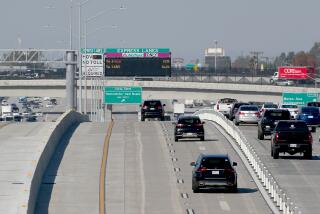Smog Check: Mend It, Don’t End It
- Share via
Smog check programs are based on a simple and popular idea: Make sure cars aren’t polluting any more than they have to so we can all breath cleaner air. People have been clamoring for clean air for decades, and smog check programs have been around since 1963. But there’s a problem. Traditional smog check programs don’t work worth a darn.
If you compare a random sample of cars in adjacent areas, one with a traditional program that tests all cars every year or two, and the other with no smog check program, you’d expect to find cleaner, better-maintained cars in the smog check area, right? Well, you don’t. If you compare regions that use expensive high-tech tests to those that use cheaper low-tech tests, you’d expect the high-tech areas to have cleaner, better-maintained cars, right? Well, they don’t. If you measure the smog in an area before a traditional smog check program is started and test the air again afterward, the smog levels should go down significantly, right? Wrong again. This shows the technical failure of traditional smog checks.
Then there’s the fairness problem. Traditional test-’em-all programs assume that every car is equally likely to have a broken emission-control system. But that’s not the case. More than half the carbon monoxide emitted by the cars and light trucks on the road come from only about 20% of the vehicles, generally the oldest and most poorly maintained. Most cars are pretty clean, clean enough not to need testing because we get very little bang for the buck cleaning up one of these vehicles compared to cleaning up one of the high-polluting 20%. Despite this uneven distribution of polluting cars, traditional smog check programs require every car to be tested, for a fee, and sometimes mandate expensive repairs for very little gain.
Traditional smog check programs are to motorists what universal drug testing would be to the whole population: an intrusive waste of time and money in which the majority of the population, people who are doing no harm, are inconvenienced, while those causing the problem have powerful incentives to find a way to cheat the test.
So how do we fix it? First, we can stop hassling the drivers of clean cars. We have the technology to cheaply scan a car’s smog level from the roadside, identify the car and send the owner a notice exempting the car from its next scheduled smog check. This kind of “clean screen” would cut down on the number of cars tested, and let us concentrate on testing the remaining ones more accurately.
Next, we have to target high-polluting cars for repair, which is tricky, since most of them are owned by lower-income households that avoid costly repairs because they can’t afford them. These people need mobility and have the same right to it as everyone else. But that right has to be reconciled with the more fundamental right to breath healthful air.
We have to both motivate and facilitate the repair of those high-polluting cars, and we can. For instance, the same roadside scanners checking for clean cars could also send courtesy notices to people whose cars are polluting at high levels, advising them of low-interest loan programs that can help them fix their cars before the problem is detected during a regularly scheduled test, at which time they’d be on their own financially.
Finally, we can get the federal government out of the micromanaging business, and get some flexibility written into the smog check rules allowing polluted areas to use the best mix of equipment for the best results. California has been working toward that with its Smog Check II program. However, the Environmental Protection Agency, with typical bureaucratic unwillingness to admit mistakes, still favors the one-size-fits-all model that’s been proved not to work.
Cars are wonderful things. They give us mobility unparalleled in history. Some 87% of American households own cars and rely on them for myriad benefits. But we have to use that mobility responsibly, which is why, despite calls for abolishing smog checks, we should insist that the government mend it, not end it.






